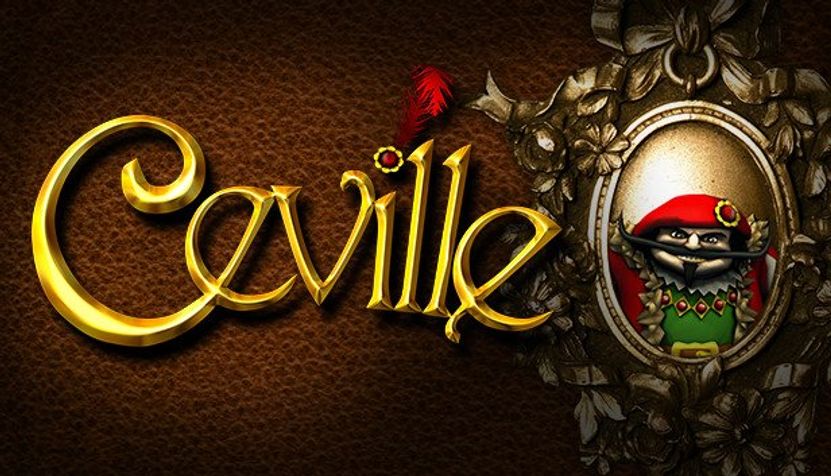Ceville
I admit, I struggled a bit with this review. I usually do with point and clicks, and that’s okay. They aren’t my favourite genre, but I try to approach them with as open a mind as I can. With Ceville, though, the usual hesitation about the genre was coupled with a sense of overall unpleasantness from the game itself. I’ve tried to set this aside, but I fully recognise that I am not an unbiased source. I’m just going to do my best.
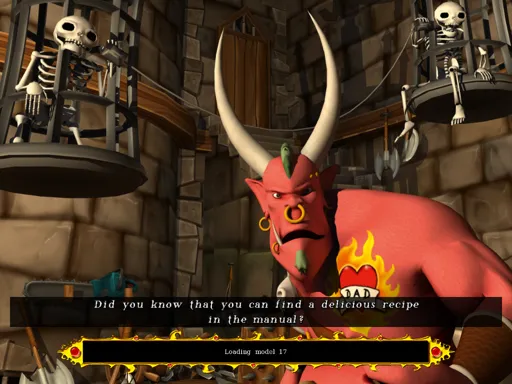 …delicious by whose standards?
…delicious by whose standards?
Ceville is a point and click adventure set in the far-off fantasy land of Faeryanis. You play as one of three characters - Ceville, the tyrannical king; Lilly, a cute little girl; or Ambrosius, the bumbling and narcissistic paladin. The three characters work together to solve problems and stop the evil advisor Basilius from taking over the kingdom. The three of them travel Faeryanis, meeting its faerie tale denizens and learning more about the world and themselves along the way.
Mechanically, Ceville is a point and click, and as such, follows the usual gameplay conventions of the genre. While it lacks many of the puzzle elements found in other point and clicks, it still includes the all-important apply-thing-to-other-thing-to-get-third-thing mechanic. The puzzles in Ceville are less explicit and more situational - which of the many objects should be applied to get to the end result? - but in some ways, this results in a stronger structure. The game isn’t slowed down by the artificial insertion of puzzles, but instead, flows more naturally from the characters’ own problem solving skills.
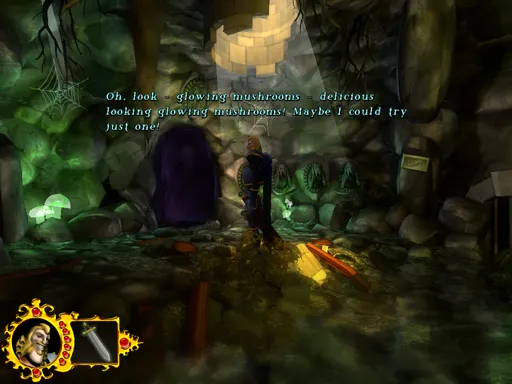 I’m not convinced this man isn’t already on shrooms.
I’m not convinced this man isn’t already on shrooms.
In thinking about what makes a point and click work, I tend to evaluate them on three criteria - puzzles/gameplay, their story, and their world. Each game may approach these differently, favouring one or another, but they all feed into that grand picture of what a game actually is while playing into what the genre strives to do.
Puzzles and gameplay-wise, Ceville is not explicit puzzle-heavy, but relies instead on situational puzzles, and figuring out what item does what. Its world does a good job providing hints for the next step through changing a mouseover icon based on how a player is meant to interact with a particular object. It is very much a game that sees its puzzle elements as fuel to move the player along rather than the element keeping the player hooked on the game in and of themselves. They are decent - nothing special, nothing particularly difficult, just a vehicle to keep the player engaged.
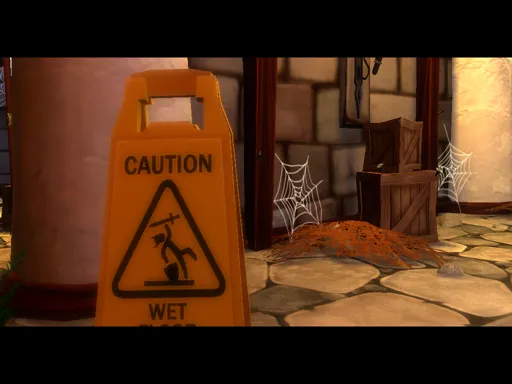 I don’t think this person was cautious on the wet floor.
I don’t think this person was cautious on the wet floor.
It’s in Ceville’s story that I find myself getting disconnected from the game. While it is a unique story, the characters within it are themselves not unique enough to make their struggles interesting, or, for those that are unique, they are unique in ways that make them unpleasant to engage with.
The main character, for instance, is Ceville. We first meet Ceville when he is deciding which of either the three little pigs or the big bad wolf to send to a labour camp. He is arbitrary, cruel, and the very picture of a tyrant who deserves to be overthrown. While the game shows his gradual transition into a redeemable character who recognises his flaws, it is a painfully gradual transition, and we as the players spend a great deal of time with this thoroughly unpleasant person.
Evil can be fun, don’t get me wrong. Morrigan (Dragon Age), Sheogorath (Oblivion), and Handsome Jack (Borderlands) are all excellent examples of how to make an evil character compelling, fun, and one that the player wants to interact with further. Theirs is a charismatic evil, and one that recognises its own vileness while also justifying it as necessary, or at least worth doing for some other purpose rather than strictly for its own sake. Ceville is an evil character, but without this charisma, charm, or greater purpose - he is simply evil for the sake of it. As much as the game’s writing want me to laugh alongside him as he jokes about torture or executions, his presentation isn’t one that can carry that humour. Rather than being a comical villain-protagonist, Ceville just becomes a deeply unpleasant character with his transformation into someone less vile being too shallow and too slow to overcome that repulsion.
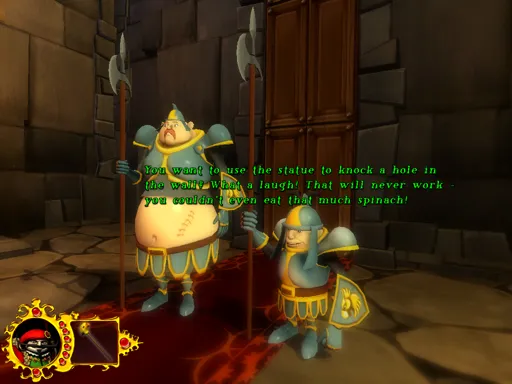 Americans will use anything but the metric system.
Americans will use anything but the metric system.
The same is true, albeit to a lesser extent, of Ceville’s two other protagonists, Ambrosius and Lilly. Ambrosius is narcissistic to the point of caricature. This is, again, an intentional choice on the part of the developers, but one that doesn’t lend itself to the humour the game’s writing is trying to cultivate. Much like with Ceville, the caricature is an unpleasant one to interact with, especially when the humour surrounding him is at his expense. It is a mean-spirited humour in a game that seems to delight in cruelty. Some of this is very much in-universe with the solutions the protagonists choose to take. Some of this, though, is in how the game asks the players to progress. It wants the players to choose the cruelest option that lays low the people of this world. In so doing, it creates an unpleasant play experience that clashes with the character development the game is trying to present.
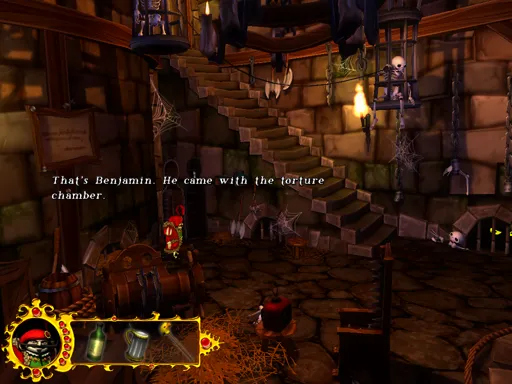 i love benjamin
i love benjamin
The world of Ceville is also a flawed one. While its explorations of faerie tales and subverting the tropes inherent to them are fun, the game chooses to engage with these in what often feels like the cruelest way. In some ways, it feels like Ceville became reactionary against the wholesomeness of Disney-fied faerie tales, choosing instead to rebel against them in a froth of teenage-gamer edginess. The world, much like the characters themselves, dives too far into caricature to feel meaningful or interesting to explore.
This is, in some ways, compounded by its graphical style. Though this game is nearly a decade and a half old and can’t be too heavily criticised for its graphics, the choices it makes for how to portray its world evoke some of the worst elements of mobile games. The colours are garish, and the character designs flat and doughy. Much like with the other elements, however intentional or unintentional this may be, the graphical choices further cement the unpleasant experience that playing this game becomes.
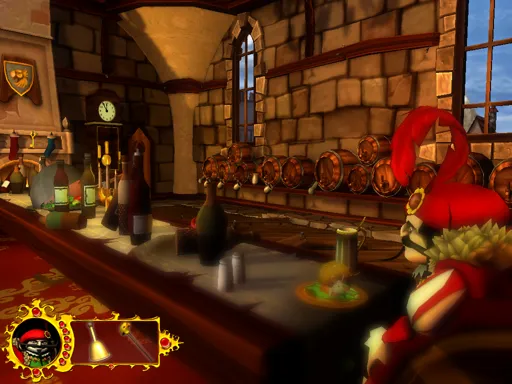 There’s always time for a rat snack.
There’s always time for a rat snack.
Ceville is a product of its time. It is the product of an old revival of point and clicks, but one that sought to ape better and more successful games. While some of its flaws are less flaws and more products of its time, its choices about what story to tell and how to tell it make for an experience that leaves the player struggling to find motivation to slog through. This game may be a more fun experience for those who are more interested in edgy subversions of faerie tales. For me, however, it was an unpleasant slog, and one I’m happy to be done with.
Developer: Realmforge Studios
Genre: Point And Click
Year: 2009
Country: Germany
Language: English
Play Time: 8 - 10 Hours
Youtube: https://youtu.be/SDRK2euwdUw
